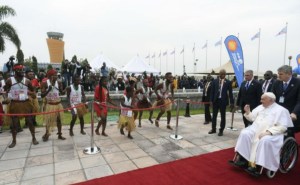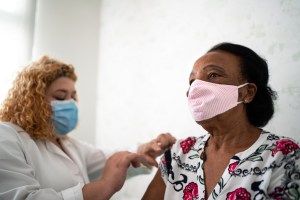By Dr. Zekeh S. Gbotokuma
AS WE CELEBRATE THE BLACK HISTORY MONTH (BHM) 2023 WITH A FOCUS ON THE THEME OF “BLACK RESISTANCE,” it is imperative to reiterate our expression of gratitude to African American heroes and sheroes who have exemplified the theories and practices of resistance. These s/heroes include but are not limited to Harriet Tubman, Sojourner Truth, Marcus Garvey, M.L. King, Jr., Malcolm X, Rosa Parks, et al. Their heroic resistance has borne fruit in many different ways, the most important of which is the recognition of the self-evident truth about the universal equality of all humans. It is precisely this recognition that has allowed, despite some imperfections, the level of socio-economic and political participation and representation that the U.S. political system has achieved. I am referring, among other things, to the election and reelection of Barack Obama as the first Black President of the United States; the Decision 2020 with Kamala Harris as the first Afro-Asian female Vice President of the United States; Sen. Raphael Warnock’s two consecutive victories in Georgia, the recent
success of the first black female member of the SCOTUS, Justice Ketanji Jackson, and the election of Wes Moore as the first black Governor of Maryland. The list is longer than this but I focused on some of these political achievements because of the key role played by the political will and true democracy in finding a way to resolve many of our socio-economic problems. Congratulations to all recent beneficiaries of the ‘Black Resistance’ in the USA and elsewhere! It is an understatement to say that 160 years after President Lincoln’s Emancipation Proclamation (1863), 158 years after the Thirteenth Amendment to the U.S. Constitution (Juneteenth) abolishing slavery in the United States (1865), 108 years after the genesis of BHM, and 75 years after the United Nations Universal Declaration of Human Rights (1948), Black Resistance is still necessary. Its necessity is justified, for example, by the big lie-based proliferation of voter suppression laws a.k.a. “Jim Crow 2.0” laws in many states and the ‘Un-Critical Race Theory’
During the BHM 2023, Americans are once again, invited to “seize the opportunity to honor the too-often neglected accomplishments of Black Americans in every area of endeavor throughout our history” (President Gerald Ford). To this end, I am sure there will be no shortages of events and reflections focusing on the United States and the African Diaspora. But since black history begins with Africa and BHM is also an opportunity to reconnect with and increase our understanding of the mother land and “the Cradle of Humanity,” I would like to seize Pope Francis’ trip to Africa this month to reflect on the relevance of that pastoral event for and its impact on the continent’s quest and request for a lasting peace through justice and sustainable development.
Francisconomics: The Papal ‘Safari’ to Africa
Pope Francis ’‘safari’ or trip to Africa exemplifies ‘Francisconomics’ and supports, to some extent, ‘black resistance.” ‘Francisconomics’ is a term that I coined based on ‘Francis’ + ‘economics.’ It simply means Pope Francis’ economics a.k.a. “The Economy of Francesco (EoF). I prolifically explained the term in my book, OBAMANOMICS AND FRANCISCONOMICS (Europe Books 2022). The most important part of Francisconomics is Pope Francis’ concern for climate change, the poor, and most vulnerable population groups, many of whom need protection and ‘resistance. ‘From January 31 to February 5, 2023, Pope Francis visited two African countries, namely, the Democratic Republic of Congo (DRC) and the world’s newest independent country of South Sudan. I will say more about DRC than South Sudan due to my familiarity with DRC, my native land and sub-Saharan Africa’s mineral-rich and second largest country (905,365 sq. miles). The papal visit was, as always, a global breaking news that shined bright spotlights on these two countries’ forgotten predicaments. DRC’s independence from Belgium in 1960 was almost immediately followed by a secession war that exasperated the Cold War when the original Congolese Prime Minister Patrice Lumumba desperately turned to the Soviet Union for assistance. The mineral-rich sub-Saharan country – a.k.a. “geological scandal”- has been in and out of ‘the business of war since its independence year. The worst part of the unrests (1996-2002) was referred to as “Africa’s First World War” a.k.a. “the seven-nation war” as it saw the participation of seven African countries, namely, Angola, Burundi, DRC, Namibia, Rwanda, Burundi, Uganda, and Zimbabwe as well as western countries that supplied weapons and profited from the chaos. An estimated 6 to 7 million people have died of war-related causes, according to the United Nations. The extremely mineral-rich eastern provinces of DRC – especially the two Kivus – have had the lion’s share of unrests a.k.a. “Congolization.” The M23 rebel group continues to enjoy Rwanda’s alleged support as merciless and greedy warlords perpetuate their carnage through abduction, kidnapping, destruction of property, mass rapes, and brutal killings. Defenseless children, girls, and women have suffered tremendously. Rapes are used as war weapons. The Congolese world-renowned gynecologist Dr. Denis Mukwege won a Nobel Peace Prize in 2018 for his work as “The Man Who Repairs Women” at the Panzi Hospital of Bukavu. He specializes in the treatment of women who have been raped by armed rebels. Willing but unable to travel to eastern Congo due to security reasons, Pope Francis met with some of the victims and survivors of violence in Kinshasa. He sympathized with them and told them, “Your tears are my tears. Your pain is my pain.”
DRC- South Sudan Similarity
Like DRC, South Sudan has not really enjoyed its post-independence era. The country seceded from Sudan (The Islamic Republic of Sudan) in 2011 due to “the northern Sudanese government’s consistent policy of marginalization of the [predominantly] non-Arab, [black], Christian, animist [and oil-rich] southern part of the country since Sudan became independent in 1956” (Christian Science Monitor, “South Sudan: 5 Key Questions Answered”). Inarguably, South Sudan’s secession epitomized ‘Black Resistance’ to oppression and the well-documented slavery in Darfur that was perpetrated by Northern Arabs and Muslims. Unfortunately, South Sudan has been fighting a civil or tribal war since 2013. The pope’s visit to Africa was not only a pastoral and ecumenical event, but also and above all, a part of the Vatican diplomacy that has joined the international community in contributing to conflict resolution and poverty alleviation efforts. To this end, “the People’s Pope exhorted Africans to reject tribalism and corruption and embrace nonviolence, forgiveness, and reconciliation.
Pope Francis’ “Hands Off Africa” Speech
Africa’s underdevelopment is a complex and complicated phenomenon that is attributable to internal (tribalism and civil unrests, corruption, dictatorship, mal-governance), as well as external causes. On his first day in Kinshasa, the Pope addressed the internal reasons by exhorting the Congolese and African people to say no to corruption and use their talents and wisdom to assume responsibility for their future. He denounced the culture of violence and the globalization of indifference, saying that, “We cannot grow accustomed to the bloodshed that has marked this country for decades, causing millions of deaths that remain mostly unknown elsewhere.” Regarding the external causes of Africa’s underdevelopment and its disrespect by the international community, ‘the first pope from the Global South’ denounced “economic colonialism” in his January 31, 2023, speech at the Kinshasa’s Palais de la Nation,
“This country and this continent deserve to be respected and listened to; they deserve to find space and receive attention. “Hands off the Democratic Republic of the Congo!”. “Hands off Africa! Stop choking Africa: Africa is not a mine to be stripped or a terrain to be plundered.”
To understand Pope Francis “Hands off the Democratic Republic of Congo” condemnation and what he calls a conflict fueled by “the poison of greed” it is important to know some facts about DRC as a “geological scandal.” Its mineral resources include Cobalt, copper, niobium, tantalum, petroleum, industrial and gem diamonds, gold, silver, zinc, manganese, tin, uranium, coal, hydropower, and timber. DRC has 80% of the coltan world reserve. Other coltan-producing countries are Australia (10%), Brazil (5%), and Thailand (5%). That’s why DRC is also referred to as a “geological scandal.” Coltan – short for columbite-tantalite – is a rare resource. It is strategic and essential to the development of new technologies (cell phones, GPS, satellites, Plasma TV, video games consoles, laptops, PDA, MP3 players, MP4 players, space rockets, missiles, digital cameras, electronic games, etc.)(Gbotokuma 2015:22).
Inarguably, the “Hands off the Democratic Republic of Congo” comments are directed to multinational companies (MNCs) that financially benefit from coltan and, as the pope put it, get rich with “”money stained with blood.” They include, among others, NOKIA, NIKON, SAMSUNG, MOTOROLA, SONY ERICSSON, LIFE’S GOOD (LG), RIM-BLACKBERRY, APPLE, DELL, HP, SHARP, ACER, TOSHIBA, NINTENDO, LENOVO, SANDISK, PHILIPS, MICROSOFT, IBM, INTEL, CANON, PANASONIC, and BAYER. According to the UN Security Council’s Report of the Panel of Experts on the Illegal Exploitation of Natural Resources and Other Forms of Wealth of the Democratic Republic of the Congo (S/2001/357) and other reliable sources, including but not limited to Alberto Vasquez Figueroa (2009), some of these MNCs are “looters,” or “pillards,” in French, because they finance wars and support corrupt governments to maximize their profits without any concern for the more than five million Congolese who have died by war-related causes. That is why coltan is also referred to as “the new blood diamonds.” The UN report also indicated that Rwanda, Burundi, and Uganda are involved in illegal exploitation and trafficking of DRC’s coltan.
In conclusion, DRC’s and South Sudan’s current predicaments are characterized by the anthropogenic phenomena of conflicts and underdevelopment conditions. Some of these conditions have been forgotten or simply ignored by the international community. Consistent with Francisconomics, Pope Francis’ visit to Africa is a call for poverty alleviation. It has also been a wakeup call to do an examination of conscience, realize the international community’s respective responsibility, and act consistent with international solidarity and universal fraternity. The African conditions that Pope Francis has deplored and condemned should not leave African Americans and peace-loving people indifferent. Let us think of and do something about those conditions as they too, call for “Black Resistance,” and universal humanism.
Dr. Zekeh S. Gbotokuma, is an Associate Professor of Philosophy at Morgan State University and Author of the Award-winning book, OBAMANOMICS AND FRANCISCONOMICS: A Call for Poverty Alleviation, Fairness, and Welfare (Europe Books London, 2022)
The opinions on this page are those of the writers and not necessarily those of the AFRO. Send letters to The Afro-American • 233 E. Redwood Street Suite 600G
Baltimore, MD 21202 or fax to 1-877-570-9297 or e-mail to editor@afro.com
The post Op-ed: FRANCISCONOMICS: Reflections on Pope Francis’ ‘Hands Off Africa’ Speech in the Democratic Republic of Congo appeared first on AFRO American Newspapers .











